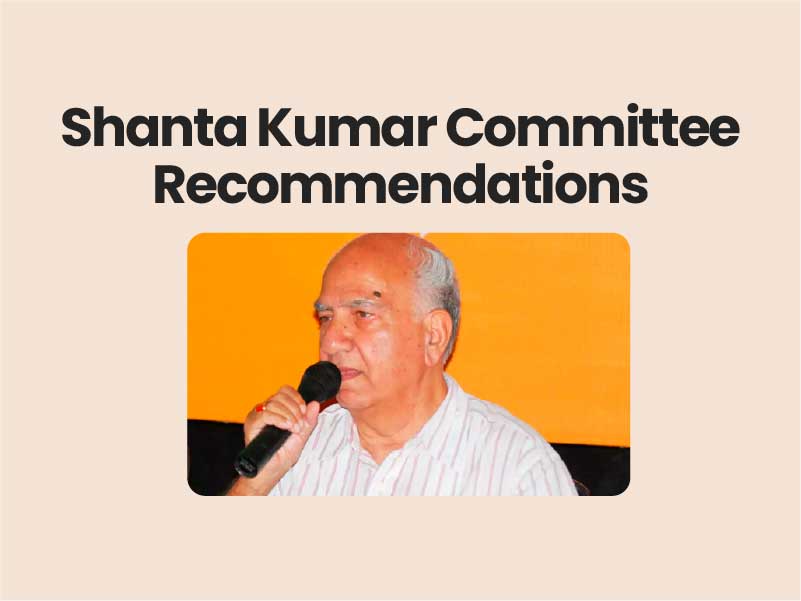Companion@360 → 7 Month programme to sharpen your writing skills → REGISTER NOW

Shanta Kumar Committee Recommendations
Background
Government of India (GOI) set up a High-Level Committee (HLC) in August 2014 with ShantaKumar as the Chairman, six members and a special invitee to suggest restructuring or unbundling of FCI with a view to improving its operational efficiency and financial management.
Government Of India also asked HLC to suggest measures for overall improvement in the management of food grains by FCI to suggest reorienting the role and functions of FCI in MSP operations, storage and distribution of food grains and food security systems of the country; and to suggest cost-effective models for storage and movement of grains and integration of supply chain of food grains in the country.
- The Committee had wide consultations with several Chief Ministers, Food Secretaries and other stakeholders in various States. Suggestions from the public were invited through various newspapers also.
- The committee submitted its report in January 2015.
Recently in the news because
The Union Minister of Consumer Affairs, Food and Public Distribution stated that primacy will be given to ensuring the functioning of FCI and it is streamlined and fast-paced as per recommendations of the Shanta Kumar Committee.
Shanta Kumar Committee Major recommendations
On procurement-related issues
- HLC recommends that FCI hand over all procurement operations of wheat, paddy and rice to states that have gained sufficient experience in this regard and have created a reasonable infrastructure for procurement.
- These states are Andhra Pradesh, Chhattisgarh, Haryana, Madhya Pradesh, Odisha and Punjab (in alphabetical order).
FCI will accept only the surplus (after deducting the needs of the states under NFSA) from these state governments (not millers) to be moved to deficit states.
Read Also Right To Information
On stocking and movement-related issues
- HLC recommends that FCI should outsource its stocking operations to various agencies such as Central Warehousing Corporation, State Warehousing Corporation, Private Sector under Private Entrepreneur Guarantee (PEG) scheme, and even state governments that are building silos through a private sector on state lands (as in Madhya Pradesh).
- It should be done on a competitive bidding basis, inviting various stakeholders and creating competition to bring down costs of storage.
- India needs more bulk handling facilities than it currently has
On Buffer Stocking Operations and Liquidation Policy
- One of the key challenges for FCI has been to carry buffer stocks way in excess of buffer stocking norms.
- The underlying reasons for this situation are many, starting with export bans to open-ended procurement with distortions (through bonuses and high statutory levies), but the key factor is that there is no pro-active liquidation policy.
- The current system is extremely ad-hoc, slow and costs the nation heavily. A transparent liquidation policy is the need of the hour, which should automatically kick-in when FCI is faced with surplus stocks than buffer norms.
- Greater flexibility to FCI with business orientation to operate in OMSS and export markets is needed.
On Labour Related Issues
- FCI engages a large number of workers (loaders) to get the job of loading/unloading done smoothly and in time.
- HLC recommends that the condition of contract labour, which works the hardest and is the largest in number, should be improved by giving them better facilities.
On PDS and NFSA related issues
- Restructuring the National Food Security Act (NFSA) by virtually diluting its scope and coverage from 67 percent of the population to about 40 percent population.
- In order to curtail leakages in PDS Government should differ implementation of NFSA in states that have not done end to end computerization.
On end to end computerization
- HLC recommends a total end to end computerization of the entire food management system, starting from procurement from farmers, to stocking, movement and finally distribution through TPDS.
- It can be done on a real-time basis, and some states have done a commendable job on computerizing the procurement operations.
Read Also Lokpal And Lokayukta
